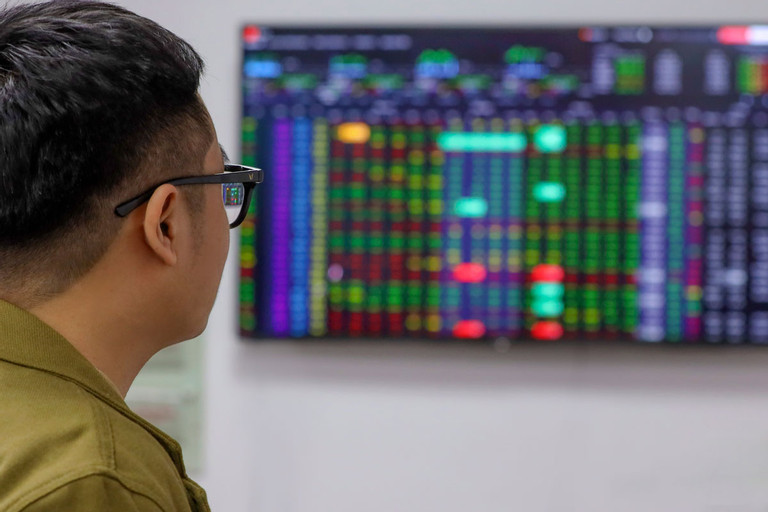
The last week witnessed the VN-Index increase at four trading session and decrease sharply in one session on Thursday.
At the November 20 trading session, the information about Van Thinh Phat’s female tycoon Truong My Lan causing a big loss of $12.4 billion affected investors’ psychology, though the case had already affected share prices the same period last year, when Lan was arrested.
The increased selling pressure in the stock market caused the VN-Index to fall by 15 points at the opening of the trading session. However, the good news was that the State Bank of Vietnam (SBV) has submitted to the government solutions to restructure the Saigon Commercial Bank (SCB), and Van Thinh Phat is hurrying to sell assets to settle the consequences.
The bottom-fishing demand later pushed the VN-Index up slightly again right at the first trading session of the week.
The green light on electronic boards was seen in the next two consecutive sessions.
The recovery was led by steel, securities companies’ shares and some real estate shares. The prediction about the increase in structural steel prices, plus the forecasted recovery of the construction industry in 2024, both supported steel shares.
Some steel mills have raised steel selling prices recently from VND110,000-410,000 per ton after three months of the prices going flat.
Petroleum shares also had a good time last week thanks to a series of new policies. The cycle for petroleum price adjustments has been reduced from 10 to 7 days, the regulation on considering premiums (awards, preferences, profits and insurance premium…etc.) calculated based on petroleum prices from domestic sources has been shortened from six months to three months, and the new decision allowing retailers to receive petrol from no more than three distributors all were factors supporting petroleum shares.
As for real estate shares, Novaland shares have been hunted by investors since mid-week trading sessions, after the Prime Minister convened a meeting to discuss solutions to the implementation of large real estate projects, including Novaland’s Aquacity project.
Nevertheless, further information about Van Thinh Phat, as well as the indictment for Tan Hoang Minh case, plus the worry about corporate bonds to mature in 2024 continued to worry investors.
The strong selling was seen on the November 23 afternoon, which caused the closing VN-Index lost 25 points in the ATC (At the Close) at the end of the day.
The unexpected plunge on the trading session caught investors off guard and ignited the sale. The downward trend lasted most of the time of the Friday session, before the bottom-fishing demand rose up, helping the VN-Index increase by 7 points.
The last week’s closing VN-Index was 1,095.6 points, which meant a 0.5 percent decrease compared with the week end before. Meanwhile, the HNX-Index decreased by 0.2 percent to 226.1 points and UpCom Index dropped by 1.2 percent, closing at 84.99 points.
The key shares which saw the sharpest price decreases included MWG of The Gioi Di Dong (-6.9 percent), Techcombank (-3.5 percent), Vinamilk (-2.4 percent). Meanwhile, NVL of Novaland share prices increased by 9.3 percent and BIDV 1.7 percent.
The liquidity in the stock market went flat with the trading value of VND21.191 trillion. Foreign investors once again sold more than bought last week with the nest sale of VND954 billion, mostly on the HCMC bourse (VND910 billion).
Bad information forecast, but upward trend maintains
Nguyen Quang Thuan, president of FiinGroup, at the recent workshop on macroeconomic and stock market prospects in 2024, commented that some of Vietnam’s macroeconomic indicators show improvements. But the firm commented that the stock prices are no longer cheap as the price to earnings (P/E) ratio has reached an historic peak, if not counting real estate shares.
FiinGroup’s Do Hong Van said though there are ‘bright spots’ in the Vietnam’s macro economy, investors need to look deeper into industries and enterprises to make decisions.
She noted that profits of listed businesses did not make any breakthrough in the third quarter. The profit of the whole market decreased by 1.7 percent, while the P/E was 13.1x, which was lower than the average level of the period from 2015 to now.
Meanwhile, many experts and investors bet on positive macroeconomic signs, banks’ profuse liquidity, and the possible strong cash flow to stocks.
Dinh Quang Hinh from VnDirect Securities noted that the upward trend has not been broken, and predicted that smart money will be less hesitant and will come back.
Manh Ha